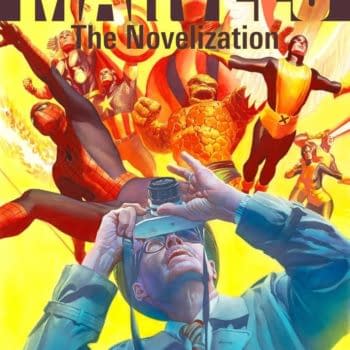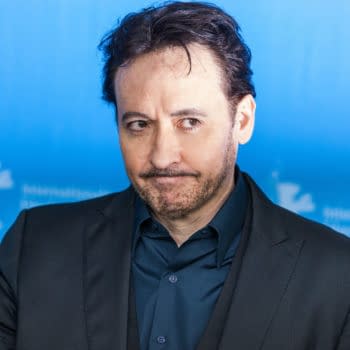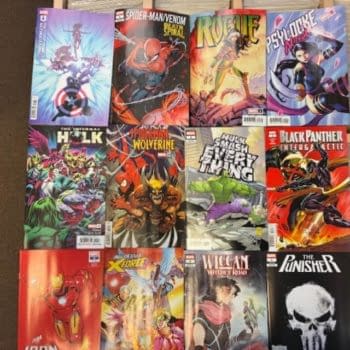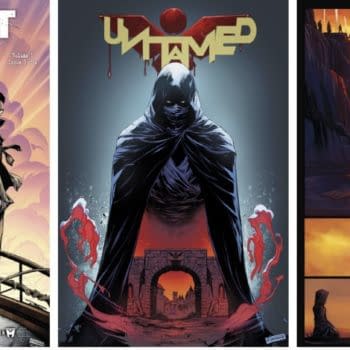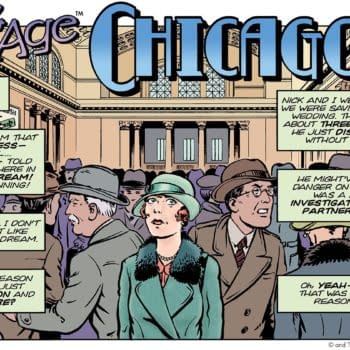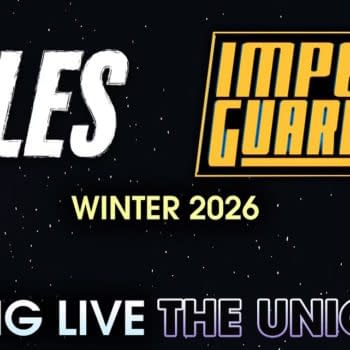Posted in: Comics | Tagged: barbara gordon, batgirl, Comics, dc comics, entertainment, female heroes, gail simone, Marvel Comics, oracle, red sonja, Secret Six, women in comics, Wondercon 2014
'When You Come Into The Industry, Bring Your Principles With You' – Gail Simone At Wondercon
The Comic Arts Conference hosted Gail Simone on Saturday at Wondercon for a Spotlight panel, and specifically focused on asking her more career-embracing questions rather than just news about her work on Batgirl.
Travis Langley moderated the Q& A with Simone that took her right back to her beginnings and presented a wide range of topics about her interests, life influences, and goals in comics.
Topics from her early life included her experiences in education, having graduated high school at 16, and attending the University of Oregon briefly until she realized she simply couldn't afford it, instead taking up a scholarship to attend beauty school, after which she became a hairdresser with her own salon, a salon which she kept running "well into writing full time".
She was an avid reader from a young age, as early as 3 or 4 years old, and her "writing skills" came about simply through telling stories. Her family didn't think of writing as a potential career since it was merely "telling lies and making up stories", more of a pastime. She "always did write", she said, since she lived on a farm with basically no television, and it rained all the time in her native Oregon.
She recalls being asked on a panel once what the "first story she was proud of" was and surprising everyone by saying it happened in the 2nd grade when she "realized how much she loved writing" after writing a horror story about a giant starfish who rose out of the sea and ate tourists, a story which traumatized her classmates. But she was thrilled with the reaction and it made her want to continue telling stories.
She was proficient in English classes at school and placed out of many of them by high school, which led to a formative experience working one-on-one with a teacher who had her reading widely in different genres and then attempting to write a different genre for each one that she read, from fantasy stories, to science fiction, then romance. She was enthusiastic to take English classes in college, but when she took creative writing courses, it was a big let down. At one point her instructor said "I really don't have anything to say to you" and the lack of connection made her more inclined to "give up" on college.
When Langley asked about her history as a reader of comic books, she described the remoteness of her childhood on a farm outside of a small town, having read all the books that came around in a "bookmobile", and looking for more to keep her entertained. She and her mom discovered some comics at a garage sale and she was intrigued by the single issue of Justice League that she found, "intriguing and subversive" to her.
Simone started writing online, a prelude to her comics career, around 1999, she said, developing message boards and discussions based on the lack of local comic shop and her observations about female characters in comics and why women didn't seem to read comics.
Her experience as a reader "was seeing female characters raped, dismembered, stuffed in refrigerators, just so male hero could vow his revenge and carry the story forward". She had "seen it happen for a lot of female characters" she'd grown attached to over the years and found it disheartening to say the least.
For her own amusement, she started writing parody pieces about the industry online that quickly got wide circulation. When someone else took credit for writing them, she wrote more to prove them wrong and this led to a weekly column. Since she was still running her salon primarily, she wrote "in secret at night" and this got her back into the "rhythm of writing", she said.
Langley asked Simone what kind of reactions she's had from the public over the years to her quest to bring stronger female characters to comics. "If I told you the stuff that's been said to me over the years you would not believe it. I've been called all kinds of horrible things. Just being a strong voice and being female brings out a lot of ugliness", she said, affirming that she still gets "hate mail" every day.
Langley asked "What's the pattern in why people are attacking you?" "I do think there's a certain amount of fear, sexism, and female hatred", Simone said, "It's not to say a certain amount of horrible things shouldn't happen to female characters, but the thing is the stories were not about them, this was about male characters getting revenge. That distinction is very important. Sometimes I do see minority characters used in the same way, but don't see typical male superheroes having this happen to them with female characters then getting revenge", she explained.
Simone gave the example of when she was first getting into industry, and asked someone "high up" in big 2, what the percentage of readers female was. "I don't know the percentage and I don't care", they replied. It was clear they were not marketing to females, 50 percent of population, which Simone felt was "crazy".
Early comics have extremely strong female characters who are "proactive", Simone said. For instance, Wonder Woman is "strong" in origin. "She fought to get off her island and have adventures. This is a character where she defined her own adventures", Simone said. It is very frustrating for Simone as a female reader to constantly see female characters who only have adventures if they are "accidental". That's "just like saying you don't have a mind of your own", Simone explained, and "only adventures thrust upon you". "That tends to make us start appropriating characters", she commented, making them stronger in our own minds than they actually are on the page. "I'm kind of sick of that. I wanted stories with female superheroes who were fully "rounded" and don't have to be appropriated to make them interesting", she said.
Fans are well aware that Simone moved from writing online to writing comics through Scott Shaw, who was a fan of her column. She was surprised by a call from an editor on the Simpson's comic and felt panicked about accepting for many reasons, including the fact that her family, including her husband, had no idea about her online writing. But in the end she couldn't pass up the opportunity no matter how scary it was for her. Later, she was approached by Joe Quesada about writing Deadpool, a character she had little familiarity with, but she enjoyed writing humor in the comics immensely, and her work on the book brought sales way up, and possibly kept it from being cancelled. Her jump to DC Comics came about through her first SDCC attendance, where she was approached by Geoff Johns, who was very supportive of her work and asked her about working for DC. She's been at DC for 8 years, now, and though she was exclusive for a long time, now she's not.
Langley asked Simone "What is about Barbara Gordon?" that interests her in her work on Batgirl. It's Batgirl's character, she said, the core of which is that she's "highly intelligent", and in her opinion the "most intelligent character in Gotham". She is always "inspiring in one way or another" in her desire to "help people" and "make Gotham a better place". She "doesn't let anything stand in the way of that", Simone said, thought it's not always easy for her.
Langley asked about the research required to write her comic books, and Simone cheerfully described herself as an "informationholic" who enjoys research, like learning about world prisons and thinking about "how a country treats prisoners and what it says about that country" in recent days.
Simone went on to write several books for DC before Batgirl, including the "D list" reboot of characters for Secret Six. She wanted to "take characters that nobody cares about and remake them", she said. She had "always had freedom" in her work, but Secret Six was about "pushing the boundaries of the mainstream", where she could "deal with gender issues" and bring in more on the "sexuality spectrum". She particularly enjoyed the "unpredictability of it all" in the series, never sure what characters would survive or be replaced.
Regarding Batgirl, Simone said the "change from Oracle to Batgirl was tough" in the New 52, but though she "loved Oracle", she believes "the Batgirl in the New 52 has the potential to be Oracle someday", which is an important concept for her.
When Langley asked how fans are responding to the change, Simone told about a recent positive experience where young boys came up to her with comics to sign, asking her about Batgirl and saying "How do you make her so badass?". "It's nice to see boys who aren't afraid to be seen with a comic with a female superhero on the cover. I love that", she said.
When Langley asked Simone to give advice about getting into comics professionally, Simone made a plea to do things in an original way and not to simple recycle ideas.
"There's no one way to break into comics", she said. "Now there are more different ways than there's ever been. There are more ways to get your work seen. The main thing is when you come into the industry, bring your principles with you, bring your perspective with you, don't recreate things that have already been done. Please don't recreate a superman character. Don't worry about where you're from, what education is, come up with something new and different that ONLY YOU CAN DO". It was quite a rousing call to arms for the audience.
Simone had a few personal things to say in closing that summed up her recent thoughts about comics. She said that yesterday (at Wondercon), she did a Strong Female Characters panel and it was "exciting" because of a huge audience for the panel with three male artists, and two female writers (Kelly Sue DeConnick and Simone). When people asked questions, they addressed the questions for the "writers" on the panel, not using the terms "ladies" or "females." For Simone, it was one of the "very first times where there was no qualifier" affixed to her role in comics. For Simone that was a "humongous change" and "I think it means something", she said.
She also shared a "terrible story" by contrast. Since she's currently writing Red Sonja, a guy e-mailed her saying, "I can't read Red Sonja anymore. You've turned her into a feminazi". In past, Simone said, Sonja was written as a "cold, aloof, judgemental" character, when written by men. "I'm writing her as a somewhat drunken, lusty, humorous, quick to anger, and warm character", Simone said, so the e-mail left her very confused, wondering if the e-mailer felt this way simply because Simone is a female writer. "Does he feel this way simply because it's written by a woman?", she asked, sure that the colder version of the character was a male-writer trait in the mast. "People have strange judgments based on their own issues", she concluded, and it isn't always based on the actual writing in a book.
It was a sprawling and very informative panel about Simone's background and influences, and explains plenty about what she's navigated in the past to get into comics, and the issues she still faces. Her encouragement for new writers and artists to create original characters and concepts resonates as one very clear way to reset the expectations of readers and break with some of the limitations of legacy characters, though for Simone, it's fair to say from this reader's standpoint that she has been on the forefront of reimagining comics from the inside out as well.
Hannah Means-Shannon is EIC at Bleeding Cool and @hannahmenzies on Twitter












